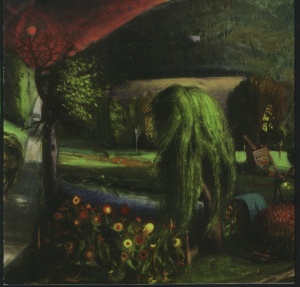
Wooden Wand and the Vanishing Voice
Gypsy Freedom
(5RC; 2006)
By Mark Abraham | 16 March 2006
Remember how awesome the late sixties were? With their Mỹ Lai massacres and Charles Mansons and Nixon-bombing-the-shit-out-of-Cambodias and Weather Undergrounds? This new trend of sixties revivalism—in which Wooden Wand and the Vanishing Voice join Jackie-O Motherfucker, Sunburned Hand of the Man, and Six Organs of Admittance—often seems like an attempt to re-narrate the decade as a long list of its dirty secrets. This album bristles and seethes and…what are we calling this stuff now? Freak folk? Does that even make sense? The Freaks hated folk, and folkers weren’t exactly psyched about Freaks or hippies. This album is dedicated to the “beautiful people of San Francisco.” The Freaks hated them, too.
Okay, so I’m not thrilled by the name, but it probably isn’t meant to be taken so literally, and to be fair, Gypsy Freedom is the first from this genre I’ve heard that comes close to a viable “what if?” scenario featuring the Mothers of Invention and the Grateful Dead since Sunburned’s Headdress from 2003. This album works as a revival of sixties idealism (i.e. separates itself from Phish, etc.) because it emphasizes the tones and meanings of psychedelic music over its typical jam-structured form. It looks to the grating noise of Freak statements like Freak Out! and Trout Mask Replica, along with the free-jazz influence of Eric Dolphy and Ornette Coleman, as a framework in which it can pursue hippie idealism. At the same time, however, its reliance on an outdated language of political expression (even Bob Dylan’s fantastic lyricism would need to be modified to fully apply to the present) means that beyond the spaces where the music works are voices waiting to tell you that even if you feel “There’s no path to follow / And no god to know / Friend, that just isn’t so.”
So I’m torn; my obsession with Dolphy means that the voice/saxophone/breath aesthetic of “Friend, That Just Isn’t So” is enticing, and singer Heidi “White Diamond” Deihl’s voice is delightful, but my growing disinterest with Quicksilver Messenger Service means that the song’s lyrics are off-putting. Similarly, the well-developed free-jazz manifesto “Sun Sets on Clarion” makes its bass and piano bubble ‘n pop at each other from opposite sides of the stereo spectrum while the guitars play barely fingered notes, but the song takes a nosedive precisely at the moment vocals like “I’m with you in Jerusalem” and “The music of the morning of the world” pan across the speakers. It’s the equivalent of saying, “Just in case you didn’t get what this is supposed to sound like, here you go.”
Unsurprisingly, then, the mostly instrumental sections of the album work far better. “Don’t Love the Liar” splays a synergy of rock guitar riffs and vocals over a steady kick drum beat, the only change being frantic notes that rain from the chorus. As a song it’s an absolute waste; however, as a short pit stop between the excellent tracks “Didn’t It Rain” and “Hey Pig He Stole My Sound,” it acts like the symbol on a mall map: “You Are Here (and your rock urges are as just as valid as the wilderness of sound in which we’ve stranded you).” Bookend “Didn’t It Rain” employs a brilliant detuned guitar line to explore tense moments before a thunderstorm, and its fellow “Hey Pig” blends frazzled guitar scrapes over timbered percussion and toms; as the latter nears its end the instruments come together to plop and plunk, giants losing large rocks in deep water.
“Dread Effigy,” Gypsy Freedom’s highlight, starts as a straight folk song, where the thick reverb and delay placed on the right channel acoustic guitar give a false sense that the tempo is speeding up and slowing down. The hard-to-discern lyrics are weaved into a hypnotic melody that is slowly overwhelmed by building noise in the background. The instrumental portion gains weight and purpose as it slowly re-imagines the structured song that precedes it, ending up something like Cat Stevens singing “House of the Rising Sun” with Mogwai as his backup band. The Sufjan-meets-Division Bell background vocals that fade in at the 3:20 mark are the sound of sunlight coming up for air. Unfortunately, “Dread Effigy” is followed by “Dead End Days With Caesar,” which takes up twenty minutes of the album’s running time and just doesn’t work. It unfolds over an unchanging bassline and brushed snares as the rest of the band fiddle with knobs and make noise; it seems like it’s meant to get somewhere, but it never quite reaches a destination. Really, it sounds like a first take at a new idea—a bunch of kids jamming for the first time, trying to play at “Dark Star,” but not good enough to create melodic interaction.
Wooden Wand end with “Genesis Joplin,” which replaces the sax from the first track with snares and kicks, and Diehl offers the album’s only compelling lyrics: “I stared bravely at the devils / For they whispered softly, ‘come’ / I have used their horns as handles / Every time we danced as one.” Gypsy Freedom allows you to dance with devils, sure, but it could take some advice from sage Carlos Santana to be truly effective: “You’ve got to change your evil ways.” Make ‘em way more evil.





